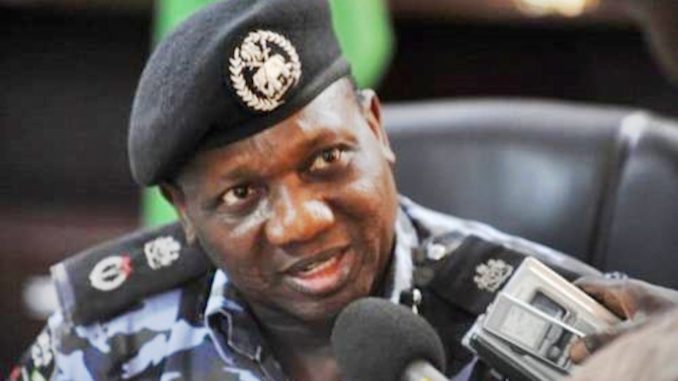
OMINOUS signs that the fundamental rights of Nigerians might be trampled upon by some security agencies, during the 2019 general election, despite being guaranteed by the 1999 Constitution, are worrisome. The Inspector-General of Police, Ibrahim Idris, declared Kazeem Afegbua wanted, and ordered his arrest recently, shortly after he released a scathing statement on behalf of his principal against President Muhammadu Buhari’s administration.
Afegbua is the media adviser to a former military dictator, Ibrahim Babangida. The statement did not pull any punches as it canvassed the emergence of a new generation of leaders in 2019, instead of those of the analogue age. It wondered why the All Progressives Congress had been pussy-footing on devolution of powers in line with its electioneering promise to restructure the country for effective governance, among other concerns that resonate with the public.
But instead of responding effectively to mounting security challenges which soldiers are routinely deployed to confront, the IG charged Afegbua with “making false statements, defamation of character, and for acts capable of instigating public disturbance.” It did not matter to him that the purported “false statement” was swiftly defended by its real author, amid the confusion set off by an unauthorised release, which tried in vain to rebut or mitigate the earlier one.
As if the police faux pas was not enough, the Department of State Services also invited Afegbua for questioning. Interestingly, the “wanted man” swaggered his way to the Force Headquarters in Abuja a few days later, and was quizzed for just 25 minutes, and let go. No doubt, the police and the DSS actions are in clear violation of Section 39 (1) of the Constitution, which entitles every person to the right to freedom of expression.
Afegbua’s harassment is not the first. Tendencies like this have been cascading. Just on February 16, the police arrested Adekunle Aliyu, the Vanguard newspaper’s Online Editor at Ikotun, a suburb of Lagos, for taking pictures of officers with okada riders. They pushed him into a Black Maria and damaged his iPad in the process. There have also been reports of some clerics being harassed or quizzed by the DSS for failing to be apolitical. But everybody is a political animal. It is time these security outfits realised that Nigeria is a democracy and respect the liberties of individuals. Citizens should keep these security agencies under watch so that the country is not turned into a fascist state.
The loyalty of security agencies should be to the country and not to the President. It is how it works in established democracies around the world. For instance, in November 2017, Benjamin Netanyahu, the Israeli Prime Minister, was questioned for several hours by the police for the fifth time following corruption allegations that bordered on accepting gifts like champagne, jewellery and cigars in return for pushing the interest of cronies.
But it rests squarely on the President’s shoulders to whom these overzealous police/DSS operatives are responsible, to ensure that they do not go off the radar of civil and acceptable behaviour. Buhari displayed this last November in Anambra State when he ordered the IG to restore immediately the security details of Governor Willie Obiano, which he (the IG) had withdrawn in curious circumstances, with a few days to the governorship election. The aides, according to the IG, were withdrawn based on the flimsy excuse that an Aide-de-Camp to an anonymous governor was caught by the military during a previous poll, escorting a vehicle loaded with arms on election day. But an illegality like this was why 26,000 police personnel, 300 vehicles, three helicopters and 15 gunboats were deployed to ensure law and order prevailed at the last election in the state.
Previous polls had overwhelmingly shown that partisan cops, soldiers and the DSS operatives undermined the integrity of the process and ultimately subverted the will of the people. This way, the 2007 general elections, conducted with a do-or-die mentality, got the dubious distinction of being the worst globally by international observers. Some governorship elections were annulled, thus introducing extant staggered elections in our democracy.
One IG was sacked a few years ago for allegedly switching his phone off on Election Day, to avoid being reached. By so doing, he betrayed the political neutrality required of his office. Sagir Koli, a captain, exposed the partisan role of the Nigerian Army in the Ekiti 2014 governorship election. Embarrassed by the details, the Army high command set up a probe panel that made far-reaching recommendations. A major-general was sacked; nine officers were handed over to the Economic and Financial Crimes Commission for corruption; 62 officers from the rank of major and below were reprimanded.
It was the same election that the police imposed a 60-hour restriction on movement in and out of the state. As a result, the APC governors like Adams Oshiomhole and Rotimi Amaechi of Edo and Rivers states respectively, were stopped from entering the state to attend the governorship campaign of their party’s torchbearer.
Unlike the Army, the police and the DSS never purged themselves of these subversive democratic elements. Therefore, they need to be restrained through eternal vigilance by all.
END

Be the first to comment